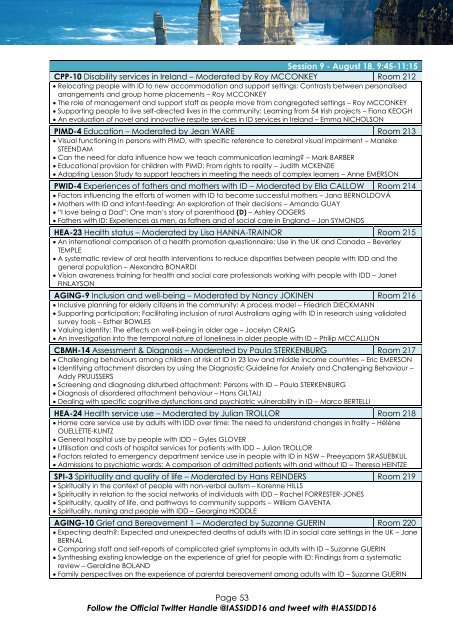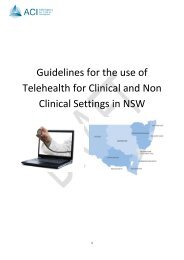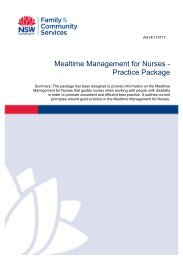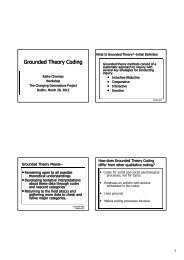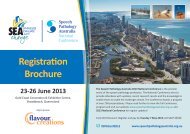Official Programme
ProgrammeBook_Final_25July2016
ProgrammeBook_Final_25July2016
You also want an ePaper? Increase the reach of your titles
YUMPU automatically turns print PDFs into web optimized ePapers that Google loves.
DAILY SCHEDULES<br />
Session 9 - August 18, 9:45-11:15<br />
CPP-10 Disability services in Ireland – Moderated by Roy MCCONKEY Room 212<br />
Relocating people with ID to new accommodation and support settings: Contrasts between personalised<br />
arrangements and group home placements – Roy MCCONKEY<br />
The role of management and support staff as people move from congregated settings – Roy MCCONKEY<br />
Supporting people to live self-directed lives in the community: Learning from 54 Irish projects – Fiona KEOGH<br />
An evaluation of novel and innovative respite services in ID services in Ireland – Emma NICHOLSON<br />
PIMD-4 Education – Moderated by Jean WARE Room 213<br />
Visual functioning in persons with PIMD, with specific reference to cerebral visual impairment – Marieke<br />
STEENDAM<br />
Can the need for data influence how we teach communication learning? – Mark BARBER<br />
Educational provision for children with PIMD: From rights to reality – Judith MCKENZIE<br />
Adapting Lesson Study to support teachers in meeting the needs of complex learners – Anne EMERSON<br />
PWID-4 Experiences of fathers and mothers with ID – Moderated by Ella CALLOW Room 214<br />
Factors influencing the efforts of women with ID to become successful mothers – Jana BERNOLDOVÁ<br />
Mothers with ID and infant-feeding: An exploration of their decisions – Amanda GUAY<br />
“I love being a Dad”: One man’s story of parenthood (D) – Ashley ODGERS<br />
Fathers with ID: Experiences as men, as fathers and of social care in England – Jon SYMONDS<br />
HEA-23 Health status – Moderated by Lisa HANNA-TRAINOR Room 215<br />
An international comparison of a health promotion questionnaire: Use in the UK and Canada – Beverley<br />
TEMPLE<br />
A systematic review of oral health interventions to reduce disparities between people with IDD and the<br />
general population – Alexandra BONARDI<br />
Vision awareness training for health and social care professionals working with people with IDD – Janet<br />
FINLAYSON<br />
AGING-9 Inclusion and well-being – Moderated by Nancy JOKINEN Room 216<br />
Inclusive planning for elderly citizens in the community: A process model – Friedrich DIECKMANN<br />
Supporting participation: Facilitating inclusion of rural Australians aging with ID in research using validated<br />
survey tools – Esther BOWLES<br />
Valuing identity: The effects on well-being in older age – Jocelyn CRAIG<br />
An investigation into the temporal nature of loneliness in older people with ID – Philip MCCALLION<br />
CBMH-14 Assessment & Diagnosis – Moderated by Paula STERKENBURG Room 217<br />
Challenging behaviours among children at risk of ID in 23 low and middle income countries – Eric EMERSON<br />
Identifying attachment disorders by using the Diagnostic Guideline for Anxiety and Challenging Behaviour –<br />
Addy PRUIJSSERS<br />
Screening and diagnosing disturbed attachment: Persons with ID – Paula STERKENBURG<br />
Diagnosis of disordered attachment behaviour – Hans GILTAIJ<br />
Dealing with specific cognitive dysfunctions and psychiatric vulnerability in ID – Marco BERTELLI<br />
HEA-24 Health service use – Moderated by Julian TROLLOR Room 218<br />
Home care service use by adults with IDD over time: The need to understand changes in frailty – Hélène<br />
OUELLETTE-KUNTZ<br />
General hospital use by people with IDD – Gyles GLOVER<br />
Utilisation and costs of hospital services for patients with IDD – Julian TROLLOR<br />
Factors related to emergency department service use in people with ID in NSW – Preeyaporn SRASUEBKUL<br />
Admissions to psychiatric wards: A comparison of admitted patients with and without ID – Theresa HEINTZE<br />
SPI-3 Spirituality and quality of life – Moderated by Hans REINDERS Room 219<br />
Spirituality in the context of people with non-verbal autism – Karenne HILLS<br />
Spirituality in relation to the social networks of individuals with IDD – Rachel FORRESTER-JONES<br />
Spirituality, quality of life, and pathways to community supports – William GAVENTA<br />
Spirituality, nursing and people with IDD – Georgina HODDLE<br />
AGING-10 Grief and Bereavement 1 – Moderated by Suzanne GUERIN Room 220<br />
Expecting death?: Expected and unexpected deaths of adults with ID in social care settings in the UK – Jane<br />
BERNAL<br />
Comparing staff and self-reports of complicated grief symptoms in adults with ID – Suzanne GUERIN<br />
Synthesising existing knowledge on the experience of grief for people with ID: Findings from a systematic<br />
review – Geraldine BOLAND<br />
Family perspectives on the experience of parental bereavement among adults with ID – Suzanne GUERIN<br />
Page 53<br />
Follow the <strong>Official</strong> Twitter Handle @IASSIDD16 and tweet with #IASSIDD16


